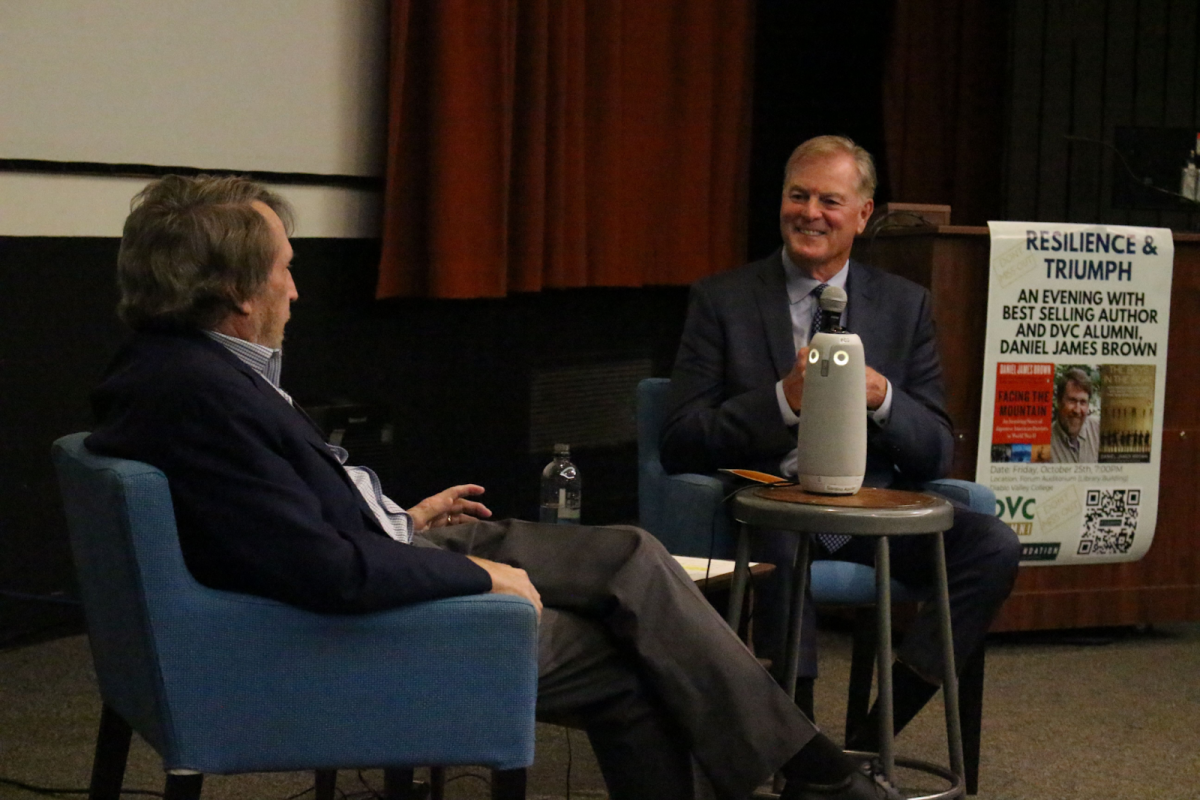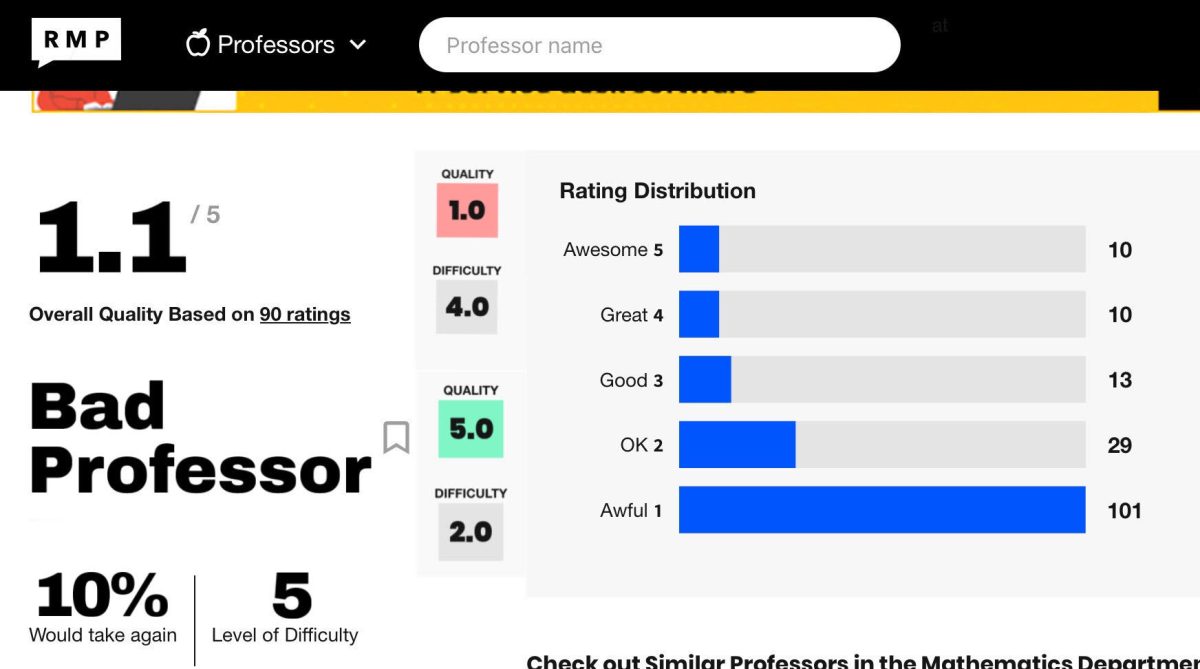Rate My Professors is the number one website for students who want to know the truth about professors in their schools. There are lots of obvious benefits for students who use the site, but how do professors feel about being rated by anonymous users?
Diablo Valley College English professor Anne Kingsley said she thinks Rate My Professors can be useful for many students because it gives them a chance to learn more about the grading system and communication style of a professor whose class they’re considering taking.
On the other hand, Kingsley said the site can also have bad repercussions on professors’ mental health and, at times, their careers.
“Rate My Professors reviews can be damaging, especially if they create harmful bias,” Kingsley said.
“Whether they are flattering or harmful, the reviews tend to flatten the full dimension of a human being [and] instructor, and may not actually be useful for real change, reflection or advancement of teaching practices.”
Kingsley nonetheless admitted that good reviews often impact how many students take a class — and said that if she were a student today she would also likely use it, since there are no other public forums for teacher reviews.
“As a student, if Rate My Professors is within my reach as a tool for previewing [a class], I would use it,” she said, “especially with no other mechanism in place.”
After all, she added, “I frequently use review sites for many goods and services, including everything from restaurants to contractors.”
A sensitive topic
Created in 1999 by the then-software developer John Swapceinski, Rate My Professors has been owned by Cheddar since 2018. In recent years it’s become a site that millions of students turn to each semester when deciding what courses to take, because it offers lots of information and commentary about professors teaching in thousands of schools nationwide.
RMP has more than four million users and most of them have left at least one review on the site. The question for many remains how accurate or fair those reviews tend to be.
Patrick Moe, a Performing Arts and Communication Studies professor at DVC, told The Inquirer he knows his students regularly read reviews on the site — and often not very favorable ones.
Moe agreed that RMP is useful for students trying to gain previous students’ perspectives on a teacher.
But, “I would hope that no students think that it’s actually an objective or comprehensive view of who that professor is,” he said.
“There are certainly times when I think maybe some students leave reviews that are very unhelpful and not fair,” Moe added. In fact, “I think for some people Rate My Professors can be detrimental.”
Moe himself has a good rating on the site, where 93 percent of reviewers say they would like to take a class with Moe again. Can numbers like that influence the amount of students who ultimately register for his classes?
“I think it could,” Moe said. Ultimately though, he joked, “most students take my classes because they need it: [it’s] a requirement.”
Students visiting RMP can evaluate how well they like a professor’s teaching style and the course’s level of difficulty. The site offers a maximum score of five in both criteria.
Importantly, registration on RMP isn’t required in order to leave a review. Instead, students wishing to give feedback about a teacher must complete an anonymous survey that consists of 10 questions, five of them mandatory — including the question of whether or not they would attend the professor’s course again.
And here’s the catch: all reviews remain anonymous, including those written by students who chose to register on the site.
Reporting this article wasn’t easy because so many instructors have had an unpleasant experience with RMP. The Inquirer tried reaching out to more than 10 DVC professors, representing a range of departments and disciplines — including individuals who received negative student responses and low ratings on the site.
Kingsley and Moe were the only two who agreed to be interviewed.
“The ratings were not entirely accurate”
Yet while Moe said he believes many students take his classes because they need them for their major, students have a different opinion. That’s because in the end, they nearly always have a choice between different professors for the same class.
Take Valerija Sedliar, a 22-year-old DVC graduate in mathematics who said she “used Rate My Professors while scheduling all of my classes.”
“Rate My Professors had a lot of information on almost all of the current professors,” said Sedliar, which “greatly helped me find professors that made my learning experience more rich and enjoyable.”
But she admitted there was a darker side to the site, due to the kinds of facts and opinions that often show up there, which aren’t necessarily helpful.
“I found that in many cases, the ratings on professors were not entirely accurate,” said Sedliar.
“I took a few courses in which the professors had a high rating at or over 4 [out of] 5, but found that while taking the course, the professor was nowhere near the standard set by Rate My Professors.”
Sedliar said the reviews and ratings on the site could be deceiving due to students’ own lack of discipline — for example, when students give a professor a low rating simply because they didn’t put in the effort to study, or because the professor gave them a low final grade.
She added that she believed some teachers receive inflated ratings from students because their courses are easy and demand little in the way of homework, not because of the good quality of teaching.
Karina Aza, a 19-year-old sophomore at DVC, confirmed she uses Rate My Professors to choose her classes each semester. The site offers students more advantages than disadvantages, she said.
At the same time, she understands the website can affect professors differently.
“I think it can be stressful for a professor to get rated online,” said Aza, “but I think their rating should be at least a decent reflection of how they teach.”
For Aza, RMP can have various consequences for professors’ careers. The outcome can be positive, for example, when a large number of people are willing to register for a class based on the teacher’s high ratings. On the flip side, she said, a bunch of negative reviews can drive down enrollments.
“It’s kind of up to the professor whether or not Rate My Professor helps their career.”













































































Bailey • Oct 19, 2023 at 9:06 am
I have found the website extremely informative and pretty right on. I took one teacher that got excellent reviews, and another teacher that had bad reviews and comments to see if it made a difference, I figured I could always just drop a class since I had extra. The teacher with the good reviews, it’s been really awesome and I’m learning a lot. The other English teacher is pretty much what it stated, it’s been terrible, lol. Probably the worst teacher I’ve had a lot DVC to be honest, however, I’m going to give it more time. I still have to time to drop the class, but it looks like so far the reviews and website are very useful.
Brianna Perez-Powell • Oct 19, 2023 at 8:53 am
Rate my Professor has definitely been beneficial for me! I understand it can be harmful, harsh to the adult being rated but that happens in life. Hearing thoughts opinions you may not agree with. Everybody has different opinions so what may works for one individual may not work for another. This does not mean the student has in accurately rated their professor or lied. It’s simply their personal opinion. While some may find rate my professor unworthy, harsh others such as myself find this website very beneficial, useful. I believe individuals who rate their professor while still being honest can take into consideration the professors personal feelings.
Nat • Oct 19, 2023 at 8:42 am
the site rate my professor is helpful. for me as a first-time student at DVC. It helps me get a head up on what to expect of the professor, how she grades, and her expectations. I see this as a shopping experience. I am paying out of my pocket, so therefore I need to know what I am buying.